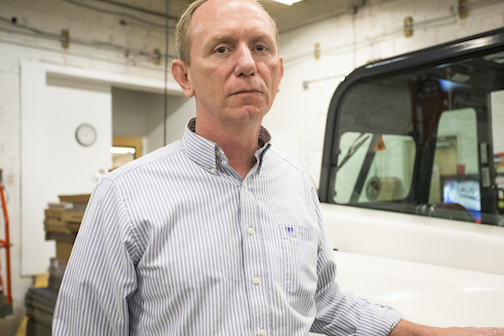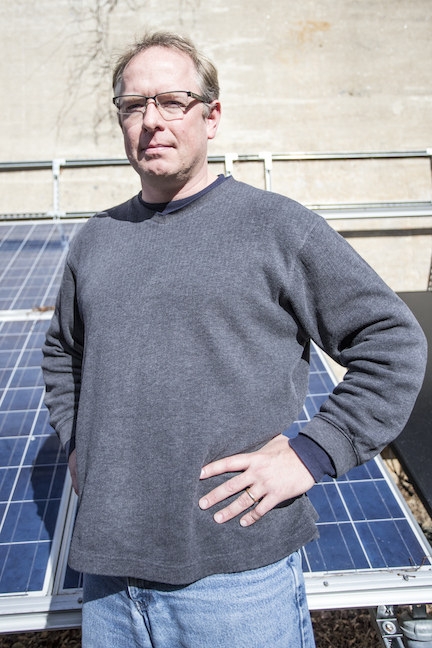Pictured here: Buncombe Commissioner Brownie Newman. Photos by Alicia Funderburk
The international debate over climate change came home Dec. 3, as the Buncombe County commissioners butted heads over a proposal to reduce the county’s carbon footprint by 80 percent over time.
Approved on a 5-2 vote, the plan calls for cutting emissions by 2 percent per year, using 2013 as a base line, until the ultimate target is met, although it sets no deadline. Commissioner Brownie Newman, who proposed the measure, says it will actually save the county money in the long term and, in any case, is needed to help avoid the worst impacts of global warming.
Commissioner Mike Fryar joined colleague Joe Belcher in voting against the plan. Meanwhile, county staff must now begin implementing the directive and determine how to measure the progress.
Environmentalists applaud move
Environmental activists hailed the county’s move. “We applaud the county for taking this solid step forward to reduce their carbon footprint,” said Ken Brame, who chairs the local Sierra Club chapter’s Political Committee. “By passing this resolution, Buncombe County has established itself as a national leader in clean energy and the fight against climate disruption. We are excited to see that the board has taken on the task of doing their part to ensure that our region is planning for the uncertain future of fossil fuels.”
Fryar, though, says he was blind-sided by language in the final resolution that specifically notes, “‘The American Association for the Advancement of Science has determined, ‘The scientific evidence is clear: Global climate change caused by human activities is occurring now, and it is a growing threat to society.’”
After days of behind-the-scenes wrangling leading up to the Dec. 3 meeting, he asserts, consensus was reached to omit any mention of climate change, focusing instead on efforts “to further reduce air pollution to improve public health and the natural health of the environment.” But mere minutes before the meeting, charges Fryar, Newman circulated a draft that re-inserted the wording about climate change.
Newman, however, says he never spoke to Fryar about the resolution before the Dec. 3 meeting. “But I also made it very clear, to everyone I spoke with, that to strip out the reference to the scientific basis for establishing the carbon reduction goals would damage the intent and the integrity of the resolution, and I was not willing to go that far. … Mike Fryar never called me. … I can’t comment on what he thought he had agreed to with other people.”
In any case, during the lengthy public debate that followed, Fryar blasted the move as “politics,” questioning whether there really is any scientific consensus on global warming. Presenting an alternate version of the resolution that didn’t mention climate change or establish a specific reduction goal, he asserted, “If you want to take the politics out of it, I’m right there with you.” Only Belcher supported Fryar’s version.
Commissioner Ellen Frost said it was Fryar who was making it “a political issue.” Instead, she countered, “It’s about good stewardship.”
Commissioner David King, the only Republican to vote in favor of the measure, said he viewed it as “a compromise” and “a local tax-saving measure,” adding, “It’s not my job to pass judgment on whether there’s a worldwide problem.”
Tracking progress
The final measure authorizes county staff to make a number of specific changes recommended in a recent energy audit by Shaw Environmental. They include improving heating systems, lighting, water fixtures and more in county government buildings. According to the audit, these improvements will cost an estimated $846,900 over five years and result in about $173,500 in annual savings.
Although the resolution didn’t allocate any money to fund the improvements, “We’re definitely giving staff a green light” to include them in the next budget, which will be drafted in the spring, noted board Chair David Gantt.
However, General Services Director Greg Israel, who’s charged with implementing the changes, says it’s not yet known what amount of carbon emissions those actions will eliminate. Thus, other steps may also need to be taken to meet the 2 percent target.

Buncombe County General Services Director Greg Israel
In recent years, Israel has overseen such projects as installing energy-efficient windows in the courthouse and adding alternative-fuel vehicles to the county’s fleet. The commissioners have praised him for consistently reducing the amount of energy used per square foot of operating space since 2006.
But since the county has expanded its facilities during that period, total carbon emissions have actually increased, notes Israel. In 2006, county operations produced about 23,400 metric tons of carbon. Last year, the total was roughly 29,600 metric tons, he reports.
And going forward, says Israel, it’s not clear to him whether the mandated 2 percent annual reductions will be based on energy usage per square foot or total energy use. “I’ve not sat down and had that conversation with them yet,” he reveals.
According to Newman, “What the resolution says is that we will reduce our carbon footprint compared to what it is now. … That it will be 2 percent less than the current year, going forward. There’s nothing in the resolution saying ‘on a per-square-foot basis’ … which makes it a more ambitious goal to go after.”
Israel, however, says a per-square-foot basis would be more realistic. “The county’s always growing, and they’re always expanding services. You’re never going to see a reduction of that magnitude unless you shut down county services. So what you have to do is quantify it by square foot,” he explains. “When the square footage goes up, the carbon footprint will go up.”
The resolution states that the overall 80 percent goal was specified because “There is strong scientific evidence” that it’s the threshold needed “in order to avoid the most severe and irreversible impacts of climate change on future generations.” Both Australia and the U.K. have committed to meeting the 80 percent target by 2050.
But regardless of how reductions are measured, after five years the county will still be a long way from achieving that ultimate goal, and the resolution doesn’t outline any further specific actions, though it does require staff to provide annual progress reports.
Following Asheville’s example
Newman’s resolution mirrors similar initiatives he pushed while serving on City Council. In 2007, he supported a measure creating a 2 percent annual reduction in city government’s carbon emissions. Since then, Asheville has actually surpassed that goal, trimming its total carbon emissions by 17 percent. The reductions are measured using 2008 levels as a base line.
The city, however, also created an Office of Sustainability charged with implementing the measure. And whereas Israel has a host of other responsibilities, Maggie Ullman, the city’s chief sustainability officer, says, “My sole job is to make sure we reach this goal.” She’s assisted by energy analyst Kerby Smithson.
In the last six years, Ullman has overseen a wide range of efficiency measures, including educating staff on ways to save energy. When she started, for example, the electric bill for City Hall was about $115,00 a year. Now, despite rate increases, it costs about $90,000 annually to power the building.
Without similar staff resources, notes Ullman, it will be harder for the county to meet its goals, though she commends the commissioners for “challenging themselves” and “taking a really good leadership step.”
For his part, Israel says the success of the county initiative is ultimately a question of money. “It’s all based on dollars. I can [meet the 80 percent goal] if the funding is there,” he explains. “You weigh the fiscal side of it with the carbon reduction side of it. Then the commissioners have to say, ‘Yes, I’m willing to do this.’”
Asked about the potential costs, Newman said the city and county could perhaps “share staffing and resources to work together” toward meeting their respective carbon goals. “There may, over time, be the need for additional people, but we haven’t had that discussion yet.”
Gantt, meanwhile, says he sees value in setting an ambitious goal, even if many tough decisions are still to come.
“The county has … to be an inspiration, to set the bar high,” he declares. “You have to have a target to hit a bull’s-eye. … We’ve got to be good stewards; we’ve got to deal with our energy future.”




Fryar blasted the move as
Expect ALEC to come out with model legislation that punishes cities or counties for using less energy or reducing carbon footprint, and expect ALEC Board member Tim “I Am Corporate America” Moffitt to introduce it in Raleigh.
https://dl.dropboxusercontent.com/u/108366839/I_am_corporate_America.mp3
Hey, it’s no crazier than ALEC wanting states to allow power companies to charge people for generating their own electricity with solar panels on their homes.
http://www.theguardian.com/world/2013/dec/04/alec-freerider-homeowners-assault-clean-energy
Thanks Tim!
Expect ALEC to come out with model legislation that punishes cities or counties for using less energy or reducing carbon footprint, and expect ALEC Board member Tim “I Am Corporate America” Moffitt to introduce it in Raleigh.
https://dl.dropboxusercontent.com/u/108366839/I_am_corporate_America.mp3
Hey, it’s no crazier than ALEC wanting states to allow power companies to charge people for generating their own electricity with solar panels on their homes.
http://www.theguardian.com/world/2013/dec/04/alec-freerider-homeowners-assault-clean-energy
Thanks Tim!
“Israel, however, says a per-square-foot basis would be more realistic.
Congratulations to Commissioner Brownie Newman and the other Commissioners who voted for this important policy commitment! Well done!
The bulk of this news story is well written, but the lead paragraphs play up the ‘debate’ on climate change and the conflict between Commissioners Fryar and Newman rather than focusing on the important action our commissioners took, and on the overwhelming science supporting that action.
Emphasizing the debate, the conflict, is a common journalistic tactic designed to hook the reader, but when applied to coverage of climate change it contributes to a false equivalence between the two sides of the debate. This false equivalence has led us to the current situation where approximately 97 percent of climate scientists agree with the theory of significant human-caused global warming, but the U.S. public thinks scientists are divided on the issue, which inhibits public policy action.
Thanks to Mr. Frankel and Mountain Express for publishing this article. After the first few paragraphs, it appropriately devotes most of the attention to the new policy itself, and to voices supporting it, rather than to the ‘debate’. I do hope that they will take from my comment a heightened awareness of the problem of false equivalence in media coverage of climate change and will guard against it in the future.
Guess it helps to be in office while passing legislation that will help your own business. Let me see… there’s a word for that… FASCISM! 8-)
Mark Cates posted a noteworthy comment:
Damage the intent and integrity? I guess Commissioner Newman forgot about the state law exempting competitive bidding that was passed for companies… just like his and literally customized for the city of Asheville. All while he was a acting as a lobbyist and sitting on the Asheville City Council. Maybe he has also forgotten the votes he has made giving companies that use his business tax payer dollars.
Funny how collectivists hate corporate welfare except when it benefits themselves or one of their own!
they seem to enjoy name calling (example: Tim “I Am Corporate America” Moffitt), yet for some reason they conveniently forget to criticize one of their own when they engage in corporate welfare.
there’s a word for that too
“…they seem to enjoy name calling (example: Tim “I Am Corporate America” Moffitt)”
I’m not sure you can disparage that as “name calling” when that is something he proudly proclaimed about himself. Let’s hear the audio one more time…
https://dl.dropboxusercontent.com/u/108366839/I_am_corporate_America.mp3